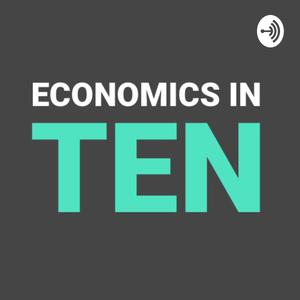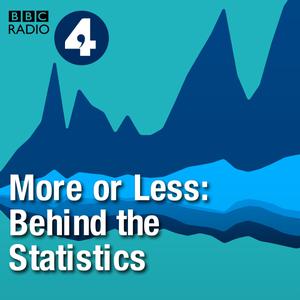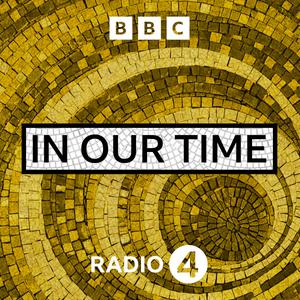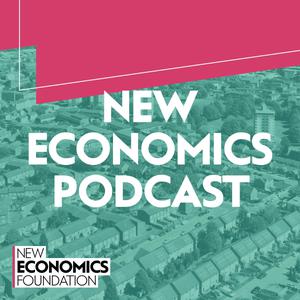
Economics In Ten
Economics In Ten
Economics In Ten is your go-to podcast if you want to learn about the lives, times and ideas of the world's greatest economic thinkers. Each episode is a fun exploration of a famous economist using ten different questions. Presented by Pete and Gav, your friendly neighbourhood economists, with technical support from Nic and music from Jukedeck - create your own at http://jukedeck.com
- 1 hour 27 minutesSupply Side Economics Special
How do you achieve the magic formula of low inflation and economic growth? In the 1970s this was beginning to move further and further away from the reach of policy makers using the traditional approach of ‘demand management’, In the post-war era fiscal and monetary policy to manage the vagaries of the economic cycle but this approach was undermined by the curse of "stagflation". The late 1970s and 1980s so the emergence of a "new" approach and policy-making saw a big swing towards the use of what became known as supply-side policies. On both sides of the Atlantic Thatcherism and Reaganomics introduced ‘trickle-down’ economics to the world and a whole suite of new policies to manage (or not manage!) the economy - but what were they trying to do and did they actually work? In this new special by Pete and Gav, your friendly neighbourhood economists, we dive into the world of supply-side economics. As always we discuss 10 questions that we hope will give you a good overview of what supply-side policies are and the key debates surrounding them. Along the way, you will come across a ‘supply’ quiz and find out which economist has actually seen one of our paintings of them! Technical support as always comes from Nic. Enjoy and afterwards, you might think about what kind of graph you might draw on a napkin that would change economics forever!
18 December 2024, 7:50 am - 1 hour 27 minutesSeason 8 - Episode 2 - Edith Penrose
What makes firms grow? This appears to be an important question, particularly with governments looking for GDP growth to be driven by firms. The normal vehicle for exploring this in Economics would be to use the 'classical' Theory of the Firm but in terms of growth, it doesn’t really have any answers or at least answers that provide any concrete implications for real-world decision-making. It was this question that the late, great Edith Penrose decided to answer and through doing this, created the Resource Based View (RBV) approach to help explain why firms grow (and some of course do not!). In this second episode of Season 8 of their award winning podcast, your friendly neighbourhood economists Pete and Gav, dive into the world of one of Diane Coyle’s favourite economists - Edith Penrose. Discover how Edith Penrose could be described as the Forrest Gump of economics and see how she challenged the economics orthodoxy of her time. Sadly there is no quiz this time but still there is poetry, food recommendations and plenty of bonhomie. Technical support comes from our own RBV Nic.
4 November 2024, 1:34 pm - 36 minutes 41 secondsCambridge Walk Special
Have you ever wanted to walk in the footsteps of the great economists? Do you want to breathe the same air they breathed? Do you want to be inspired by the ghosts of Economics past? Well now's your chance. Cambridge is rich with economic history and in this podcast special, recorded on the hoof, your friendly neighbourhood economists, Pete and Gav, take you on a 4 mile journey around Cambridge. Starting at Keynes’ family home and ending at Jesus College, you will find out why certain landmarks are important within the world of economics. It should take you 90 minutes to walk and on the journey, you can pay homage to the likes of Robinson, Marshall, Deaton and Malthus. Technical support as always comes from 'I think they are usable' Nic.
27 September 2024, 5:48 am - 1 hour 23 minutesSeason 8 - Episode 1 - Herbert Simon
One of the fundamental principles of orthodox economics the idea that all economic agents "maximise" - consumers aim to maximise utility (econ speak for happiness) and producers profit. Nobel Prize winning economist Herbert Simon challenged this assumption and in doing so coined a new verb, ‘to satisfice’ to show how consumers and producers in the ‘real world’ behave somewhat differently. This is the first episode of Season 8 of our award winning podcast, with the theme of the season being "the economists' economist'. In this episode, your friendly neighbourhood economists, Pete and Gav, enter the world of Ha-Joon Chang’s favourite economist - Herbert Simon. In the course of our journey of discovery we will meet a robot named after Herb, suggest the perfect past-time for long train journeys and discover Simon's surprising and unusual sartorial choices. As always there is a challenging quiz and lashings of bonhomie. Technical support comes from our muse Nic.
PS You may hear background vocals from baby Henry during the course of the episode and we would correct the following errata which occurred during the course of enthusiastic discussions:
Tom Swift was a character from American teen sci-fi books
Mr Miyagi of Karate Kid fame was, in fact, Japanese
12 July 2024, 8:57 am - 1 hour 24 minutesMonopoly Special
A feature of our economic world is how dominated many markets are by a single firm. If you want to search for something, you ‘Google’ it, if you want a cab, you reach for Uber and if you want to shop, Amazon is the place many will go. Standard economics would suggest this is a bad thing as competition is good for the market, so how has this happened? How bad are monopolies? And are there any upsides? In this podcast special, your friendly neighbourhood economists (who were slightly under the weather) Pete and Gav, explore these questions and more! It’s absolutely stuffed with economic terminology, expertly explained, with lots of case studies to apply your new knowledge to. Perfect for students but perfect for everyone! As always there is a quiz and plenty of book recommendations. Technical support as always comes from our own monopoly on production Nic!
31 May 2024, 5:00 am - 1 hour 34 minutesSeason 7 - Episode 5 - Friedrich Engels
Friedrich Engels was probably the most influential sidekick in the history of the world. He bankrolled his "bestie" Marx and without his deep pockets, it is unlikely the world would ever seen the intimidating Marxist tome ‘Das Kapital’. The even more (in)famous ‘The Communist Manifesto’ was the results of genuine collaboration between the two. Engels without question changed the world and yet was seeming happy to do so from the background, playing second fiddle to his beloved Marx. In this episode of their award winning podcast, Pete and Gav, your friendly neighbourhood economists, bring Engels out from the shadows and give him the respect that he deserves, as a thinker, writer and revolutionary. You will discover how influential his book ‘The Conditions of the Working Class in England’ was both now and then, you’ll wonder whether he was was the first ‘effective altruist’ and you’ll also consider how you can be the exploiter of the proletariat, the definitive champagne socialist, whilst at the same time, trying to set the poor free. As always, there is a fun quiz and lots of book recommendations. Technical support comes from ‘Beach Body’ Nic.
20 May 2024, 7:41 am - 30 minutes 44 secondsRational - A Play About Economics
What if rational economic man existed? How would they view the current state of the planet? How would they solve ‘the economic problem’? If it was to be solved by extreme methods, how would you respond? In this new play by your friendly neighbourhood economists, Pete and Gav, these issues are tackled in a fun and thought-provoking manner. Will you side with Dr Becker, the doctor who has created ‘Homo Economicus’ or will you side with Adam The Clone? Listen to the play and then have a think about some of the questions that have been put online to discuss. Thanks always goes to Nic for his production wizardry and to Kate for being the narrator.
12 April 2024, 7:36 am - 1 hour 16 minutesSeason 7 - Episode 4 - Gary Becker
Imagine looking at the world and seeing economics everywhere. Whether it was in family dynamics, discrimination in the workplace, the criminal mind…absolutely anything!!! When first mooted this was an alien idea to many, including many economists but this was the novel approach of the highly influential and award-winning economist Gary Becker. Becker is many economists' favourite economist, at least those economists keenest on market-based, "rational" approaches. Where once economics stayed in its lane, now, post-Becker, Economics goes wherever it chooses, with tools such as cost-benefit analyses applied in all areas of human activity. Nothing is safe from economics thanks to Gary Becker! Whether he deserves our thanks our opprobrium for this is debatable but in this episode of their award winning podcast, Pete and Gav, your friendly neighbourhood economists, explore his life and ideas. So if you are wondering why students should now do an investment appraisal before going to university or why siblings are nice to each other, even when they are horrible to other people, then this podcast is for you! As always there is a quiz, some music and book recommendations and a cocktail you can make to compliment the episode. Technical support comes from ‘Ace of Bass’ Nic.
15 February 2024, 5:00 am - 54 minutes 2 secondsLondon Walk Special
Have you ever wanted to walk in the footsteps of the great economists? Do you want to breathe the same air they breathed? Do you want to be inspired by the ghosts of Economics past? Well now's your chance. Ye olde London Town is rich with economic history and in this podcast special, your friendly neighbourhood economists, Pete and Gav, take you on a 3 mile journey around Central London. Starting at the British Library and ending at the LSE, you will find out why certain landmarks are important within the world of economics. It should take you just over an hour to walk and on the journey, you can pay homage to the likes of Marx, Keynes and Fawcett. Technical support as always comes from 'The Stitcher' Nic.
4 December 2023, 5:30 am - 1 hour 28 minutesSeason 7 - Episode 3 - William Stanley Jevons
One could argue that the modern discipline that is Economics is, to a large degree, a branch of applied mathematics. This is a far cry from its early roots found in the work of more philosophical thinkers such as Adam Smith. How did we end up here? One major reason is the "Marginal Revolution" of the nineteenth century. In this episode of their award winning podcast, Pete and Gav, your friendly neighbourhood economists, explore the life and ideas of William Stanley Jevons, one of the proponents of this less than bloody revolution. He was the man who turned Political Economy into Economics and said in his most famous book ‘Theory of Political Economy‘ - ‘Economics, if it is to be a science at all, must be a mathematical science’. As always, there is a quiz for you to enjoy linked to the Jevon's Number, a poem that distils his life in rhyme and a discussion about whether the weather has any impact on business cycles whatsoever! Technical support as always comes from Nic.
17 October 2023, 7:13 am - 1 hour 31 minutesSeason 7 - Episode 2 - Robert Lucas Jr
Abraham Lincoln once said “You can fool some of the people all of the time, and all of the people some of the time, but you cannot fool all of the people all of the time.” This quote has been wheeled out to the point of cliche but we believe it epitomises the work of Nobel Prize winning economist Robert E Lucas Jr. The (perhaps reluctant?) leader of the New Classical school of economics, he made his name with his deceptively simple analysis of "rational expectations" and was lauded (at least by some) for putting Keynesianism to the sword after its long period of ascendancy in the post-war era. In this second episode of Season Seven your friendly neighbourhood economists, Pete and Gav explore his life and ideas and explain the various economic phenomena that have Lucas in their name - his wedge, paradox and most famously his "Lucas critique". Ardent fans will be delighted by our usual quiz, which this time is based around the number 50, as this is the fiftieth episode of our show. You will also be the grateful recipients of a poem and more book recommendations than you can shake a stick at! Technical support as always comes from our homeboy Nic.
7 August 2023, 5:00 am - More Episodes? Get the App
Your feedback is valuable to us. Should you encounter any bugs, glitches, lack of functionality or other problems, please email us on [email protected] or join Moon.FM Telegram Group where you can talk directly to the dev team who are happy to answer any queries.
 Analysis
Analysis
 More or Less: Behind the Stats
More or Less: Behind the Stats
 LSE: Public lectures and events
LSE: Public lectures and events
 In Our Time
In Our Time
 New Economics Podcast
New Economics Podcast
 Political Fix
Political Fix